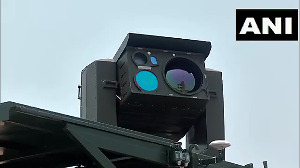It's an unusual feature of India's general insurance industry.
The entire industry is losing heavily on auto insurance but nobody is doing much about it. It's an approach that's also hurting the Indian consumer and the cause of automobile safety.
Consider this damning statistic: against every rupee collected as premium for motor insurance in India, the outgo in respect of damage to the vehicle is around 70-80 paise with over Rs 3 incurred in respect of death and personal injury, according to studies carried out by the National Insurance Academy.
Five years ago, according to the audited figures of General Insurance and other public sector companies, Rs 3,091.73 crore (Rs 30.917 billion) was collected as premium.
By comparison the companies faced claims of Rs 3,537.66 crore (Rs 35.376 billion).
In fiscal 2001, the premium collected was Rs 3,810.61 crore (Rs 38.106 billion) and Rs 4,593.60 crore (Rs 459.36 billion) was spent on settling claims.
While insurance companies are quick to claim that the ill health in the portfolio is because of the uncapped nature of third party liability, a factor that continues to be ignored is the direct stake that insurance companies have in promoting automobile safety standards and hence reducing their outgo in terms of claims towards death and personal injury.
For instance, third party premiums collected in 1998-99 was Rs 941.29 crore (Rs 9.412 billion) while the claims incurred were more than double at Rs 1,960.71 crore (Rs 19.607 billion). Two years ago, while the premium was Rs 1,084.60 crore (Rs 10.846 billion), the claims incurred were Rs 2,990.8 crore (Rs 29.908 billion).
So this inaction comes at a time when insurance companies could probably change the dynamics of safety norms, by doing one simple thing, mandated by the Insurance Act -- share data on insurance claims with the Tariff Advisory Committee.
This is something which certain public sector insurance companies have been avoiding.
Sharing data would enable detailed studies of aspects related to motor accidents and help companies build a database, which also could educate consumers on safety aspects.
Over time, such an approach would bring down accident rates and also enable insurers to charge differential rates of premiums from clients depending on individual experience once India moves into a de-tariffed market situation.
Paradoxically, while bleeding, motor insurance continues to be the fastest growing portfolio in the non-life insurance segment in the country and today controls more than 38 per cent of the total general insurance premium of about 14,167.86 crore (Rs 141.678 billion) last year.
According to H Ansari, Chair Professor, General Insurance, National Insurance Academy, though motor insurance appears to be the simplest to underwrite, the experience of the Indian market during the last 15 years has been anything but satisfactory.
While the non-sharing of information is in strict violation of Section 64 UE of the Insurance Act 1938, which gives legal sanction to the Advisory Committee to demand information, what it also ends up doing is delivering a body blow to consumer interests.
Insurance companies under the Insurance Act can be slapped with a fine not exceeding Rs 1,000 and can also be asked to pay Rs 500 per day for not furnishing data.
Chennai-based United India Insurance Company, chairman and managing director, V Jagannathan, says that United India has shared claims data with the TAC up to March 31, 2003.
"The insurance industry's problem is unlimited third party liability, which is making motor insurance as a whole unviable," he adds.
But TAC sources point out that the sharing of data by PSUs like United India is in a clustered manner (once a year).
Says, Antony Jacob, deputy managing director, Royal Sundaram Alliance Insurance, "Free market data is critical for insurance companies to develop their product pricing modules in an open business environment. To build a competitive tariff-free insurance industry in India, we would like to see an industry-wide collection of information, where all insurers cooperate for overall growth."
But, according to NIA's Ansari, insurance companies need to do this and more. "As responsible entities, insurers must support road-safety aspects which have a telling effect on claims. The insurers have to support research into safety on the roads and fund such projects on a sustained basis."
The Insurance Regulatory & Development Authority has announced that the own damage section of motor insurance would be de-tariffed effective April 1, 2005.
This would also mean that post-March 31, 2005 insurance companies would be charging premiums based on the safety records of the automobiles.
The sharing of data could lead to better management of the motor portfolio and the data would help analyse loss experience trends, severity of the losses resulting in rates being linked to reflect the risk profile of the insured.
The TAC has simplified the form for collection of data for motor related statistics. Despite this, public sector insurance companies have not shared data in the prescribed format and continue to send clustered information. This, say sources, is because of the poor level of in-house automation.
"When the new forms were introduced in 2001, the PSUs wanted two years to comply, and would furnish information only in a clustered manner till then. But even that is not being adhered to by some," says a TAC source.
The former chairman of the IRDA, N Rangachary, is more candid. "Insurance companies are on a self-destruct mode and the consumer is being taken for a ride," he says.
"Forget the debate on how important sharing of data is in a de-tariffed environment in April 2005. Isn't it important even now? Statistics on claims should be forthcoming on what basis tariffs are being levied. The risk today is not being properly evaluated and distributed. Today good risk is subsidising bad risk," he adds.
Agrees C S Rao, chairman IRDA, "If only PSUs shared claims data regularly, the tariffs levied will be more scientific."
Rangachary points out that crash testing of vehicles can be financed by insurance companies and cites the offer of 50 acres of land by the Tamil Nadu government for the purpose.
In the US, insurance companies have come together to form a consortium which funds the independent testing of automobiles and since data is shared, a prospective buyer knows what is the accident record of a model as well as the insurance premiums associated with the particular make of the automobile.
"The way forward would be to ensure that penalty for violations, in terms of non-sharing of data on claims be severe, including cancellation of the license. Today the penalty is so small that insurance companies prefer to pay the fine rather than share data," says an insurance broker.







 © 2025
© 2025